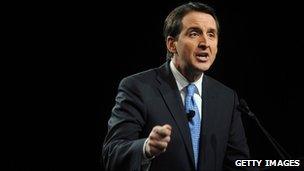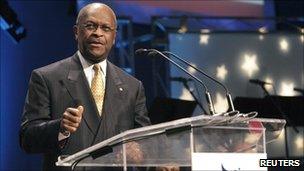Tim Pawlenty announcement kicks off 2012 campaign
- Published

Tim Pawlenty has been labelled bland by some observers
Nowhere else in the world is there a political spectacle quite like a US presidential election - and the 2012 campaign has just kicked off in earnest, over 19 months before election day.
Former Minnesota Governor Tim Pawlenty formally announced on Monday that he had formed an "exploratory committee" to assess a bid for the presidency.
Although that does not sound like much of an announcement - a committee to explore the possibility of another committee? - in Washington political-speak, it is a siren announcing that a candidate's hat is officially in the ring.
Mr Pawlenty is actually the second Republican candidate to form an exploratory committee.
Herman Cain, the former chief executive of a pizza chain and talk-radio host, announced the formation of his committee in January, but he is widely considered a long shot.
Mr Cain has some support within the fiscally conservative Tea Party movement, particularly because he is credited with helping kill President Bill Clinton's health care reform plan in the early 1990s.
But he has never held public office and has limited institutional support in the Republican party.
Mr Pawlenty, on the other hand, is viewed as a top-tier candidate, along with Mitt Romney, Haley Barbour, Newt Gingrich, Sarah Palin and Mike Huckabee.
He served two terms as governor of Minnesota, where his fiscal restraint and economic management were applauded by conservatives - and decried by liberals.
He was an outspoken critic of President Barack Obama's healthcare overhaul, which plays well with the Republican base, and he is a devout Christian.
Too late?
Announcing a presidential bid in March of the year before the year of the election may seem wildly premature, but in terms of recent US presidential politics, it's actually a little late.
The 2008 election set new records for campaigns. It was the longest, at 22 months, and most expensive, at $1.7bn (£1bn), in history.

Herman Cain, ex-chief executive of Godfather's Pizza chain, formed an exploratory committee in January
In that cycle, Democrat John Edwards announced his campaign in late December 2006, followed by Hillary Clinton and Barack Obama on 20 January and 10 February 2007 respectively.
On the Republican side, Mike Huckabee, Rudy Giuliani and Mitt Romney all made their formal announcements in late January or early February of 2007. John McCain, the eventual nominee, announced on 1 March 2007.
By those standards, Mr Pawlenty's announcement seems positively tardy.
But the consensus in Republican circles is that the 2008 campaign was an unnecessarily punishing one, which not only the candidates, but political operatives, voters and donors all found exhausting.
In shortening the race a little, they are hoping to avoid campaign fatigue.
Who's next?
There's a sensible rationale behind Mr Pawlenty being one of the first out the gate. He is not as well known as some of his probable rivals, and the attention generated by his announcement will help raise his name recognition.
He currently trails many opponents in polls, but much of that can be attributed to his low national profile.
Forming a committee this early will also help with his official fundraising efforts - an area of concern when potentially running against Mitt Romney, who has a substantial personal fortune and many wealthy associates to draw from, and Sarah Palin, who is a fundraising powerhouse.
The next candidate to declare his intentions could be Mr Gingrich, who made a rather odd announcement recently that he was exploring the possibility of setting up an exploratory committee, but has not yet formally done so.
Political pundits have speculated that Mr Gingrich is having difficulty unravelling the financial implications of his various political activities over the years.
Mr Barbour, the governor of Mississippi, has said he will make a decision on a presidential run in April, but he has already been snapping up seasoned Republican operatives including Mike Dennehy in the critical early state of New Hampshire, former Republican National Committee spokesman Jim Dyke and Florida's Sally Bradshaw, who worked for Mitt Romney in the last cycle.
Mr Romney has been tight-lipped about when he will make formal steps toward a bid, but he has already raised a small fortune on the Republican fundraising circuit.
Each of the potential candidates has also been doing the rounds of political conventions, such as the Conservative Political Action Committee in February, as well as making visits to some of the all-important early primary states - Iowa, New Hampshire, South Carolina and Florida.
They are all fully aware of their Democratic opponent - President Barack Obama is unlikely to face a serious challenger. He has already set up his re-election campaign HQ in Chicago and dispatched key staffers including David Axelrod and Jim Messina to fire up the engines.
Flawed field
Mr Pawlenty has bravely made an early move. And he may end up being the last man standing.
All of the high-profile Republican contenders have serious drawbacks to their candidacy.
For example, Mr Romney passed a healthcare bill as governor of Massachusetts that was strikingly similar to Mr Obama's plan - a plan loathed by Republicans. Mr Gingrich has a chequered personal life that includes affairs and multiple marriages.
Mr Barbour has been caught making favourable comments about the White Citizens' Councils of Mississippi in the civil rights era, prompting accusations of racism.
The main charges against Mr Pawlenty? He's boring. Unexciting. Lacking in charisma.
Mr Pawlenty has taken steps to address that worry, releasing a series of slick, cinematic promotional videos, external.
Nonetheless, in a field of flawed candidates, dull could win the day.
- Published21 March 2011
- Published11 February 2011
- Published3 January 2012
- Published23 November 2010